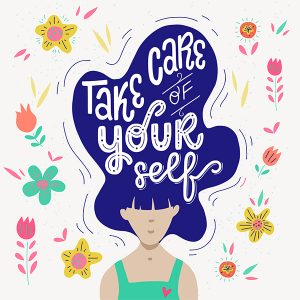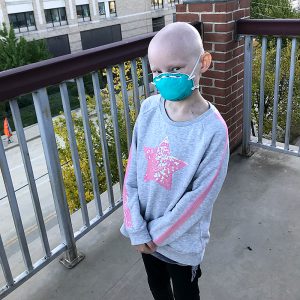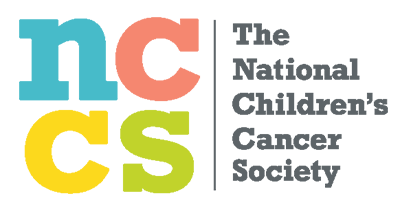Holidays are always a stressful time with the extra hustle and bustle. Families tend to socialize more, spend more, eat more and sleep less during this time. Having a child with cancer in addition to the holidays can be overwhelming.
It is important to take time for self-care and recognize when you are feeling stressed. Some common signs of stress are irritability, sleep problems, feeling anxious, chest pains, fatigue, headaches, rapid heartbeat, stomach problems and trouble concentrating. Research shows that regular self-care practices can reduce the adverse effects of stress.
Cancer treatment and side effects are often out of your control and can be very stressful. Self-care is a wonderful way to feel empowered.
What is “Self-Care?”
 “Self-care” are practices that promote well-being in mind, body and soul. The most common types of self-care are exercise, healthy eating and good sleep. These are also the hardest to fit into a busy, unpredictable cancer treatment lifestyle.
“Self-care” are practices that promote well-being in mind, body and soul. The most common types of self-care are exercise, healthy eating and good sleep. These are also the hardest to fit into a busy, unpredictable cancer treatment lifestyle.
Proper nutrition is very important but often difficult when living in a hospital room. Emotional eating can often take over as well. This can be an effective distraction but in the long run will lead to increased anxiety, dependence on food and weight gain.
Self-Care during the Holidays
During the holidays last year, 9 year-old Anna caught the flu and another virus in addition to battling neuroblastoma. Spending time in the ER is not how anyone wants to spend the holidays. Anna’s mom, Ashley, is planning ahead for this year. She suggests limiting the amount of people you see and avoid large gatherings with family and friends. Ashley always asks herself: “Will the benefits of attending outweigh the potential harm of attending?” This helps her find balance and boundaries during the chaotic time of year.
Ashley agrees sleep is very important. Chronic sleeplessness can alter your emotional and physical health. It can lead to additional stress, weight gain or irritability. “We do try to keep our kids on a predictable sleep schedule and squeeze in naps whenever possible for us adults.”

Meet Anna – Neuroblastoma Warrior
Exercise is also a very helpful and healthy form of self-care because it triggers the same hormones in your brain as anti-anxiety and antidepressant medications. This may be the most important to fit into your schedule, even if it’s just walking around the hospital. “My husband and I trade off exercise days so that we both keep a fairly regular routine,” said Ashley. “I watch the kids on Saturday morning while he rides his bike and then usually I take a long walk Saturday evening with a friend.”
Gratitude and staying positive is another important self-care tip. Simply thinking about what you’re thankful for builds stronger positive emotional pathways in your brain. Ashely also added, “I would suggest focusing on the blessings of being together and all the delights of the holiday season. We do things in the car or outside- like driving to look at lights or visiting an outside light display. We try to celebrate our health and time together more than gifts.”
Your self-care needs are likely to be different from others and could change over time. It’s important to know numerous approaches so you are prepared. Other ideas can include:
- Seeking and accepting support from others
- Spending time with loved ones
- Using aromatherapy/essential oils
- Meditating
- Engaging in activities you find fulfilling such as crafting, taking a bath, baking, reading
- Getting a massage
- Starting a journal or blog
- Listen to calming music or using relaxation apps
Most importantly, don’t wait until you are overwhelmed. Recognize the signs and identify the sources of stress so you can take the needed action. Remember, as the flight attendants say, “Put your oxygen mask on first before helping others.” You can’t take care of your child if you don’t take care of yourself first.

